| Bobby Watson | 10 juin 2013 | | Kansas City Barbecue Suite | | © Jazz Hot n°664, été 2013 |
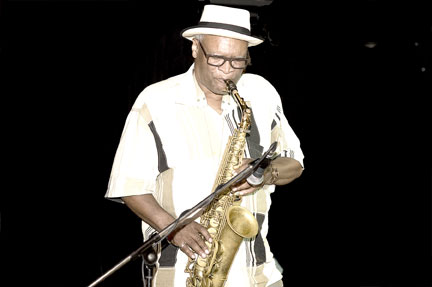
Bobby Watson was born on August 23rd, 1953 in Lawrence, Kansas. After going to school and high school in Kansas, he went to college in Miami the same year as Pat Metheny and Jaco Pastorius and graduated in 1975. Though free jazz and fusion were at its peak, he chose straight-ahead jazz as he became a member of Art Blakey’s Jazz Messengers. He belongs to this ‘lost’ generation of musicians that kept digging the path initiated by Louis Armstrong, Duke Ellington, Charlie Parker (whom he chose to play the same instrument) and Dizzy Gillespie. Though he has a diploma, he recognizes his apprenticeship as a jazz musician to Art Blakey. He saved him a lot of time thanks to his example, conception of music and relationship with the audience. In Jazz Hot's 2005 Special Issue on Art Blakey, he talked about his relationship with the great drummer.
With a discography impressive by its quantity and quality, especially with Italian label Red Records, he shared his time with his bands, notably Horizon, the 29th Street Saxophone Quartet and the most prestigious musicians in jazz, Max Roach, Louis Hayes, George Coleman, Sam Rivers, Branford and Wynton Marsalis, and many singers, Joe Williams, Dianne Reeves, Lou Rawls, Betty Carter, Carmen Lundy… not to mention his mentor Art Blakey.
With advancing years, he returned to Kansas City to fill a position as department head of jazz at the University of Missouri. If his predecessors and himself learned everyting on stage, the music scene has completely changed. He can only pass on his experience as a musician through his teachings as well as leading the University’s big band through which the students gain experience. Thus he can preserve his financial security and pass on the music that cannot be learned in methods nor fakebooks but by confronting other musicians and the public. The financial security allows him to choose his contracts and play out for pleasure more than of necessity. Turning 60 this year, Bobby Watson has a lot to teach.
« I Have a Dream » is his latest project for the summer 2013. This show celebrates the 50th anniversary of Dr. Martin Luther King, Jr’s famous speech, and features poet Glenn North, Hermon Mehari (tp), Richard Johnson (p), Curtis Lundy (b) and Eric Kennedy (dm). The privileged spectators of the French Jazz festivals of Foix (in Ariège) and Jazz at Fort Napoléon at La Seyne-sur-Mer (in Var) appreciated his performance and the radiant personnality of this wonderful artist during the summer 2012 (see Jazz Hot n°661). His beautiful sound and incredible generosity allowed him a surprising jam at Foix where he played with simplicity, attention and generosity. A gentleman of the first order!
Interview by David Bouzaclou,
translated by Guy Reynard, author of the introduction and discography
Photo credit and caption, click on photo
Jazz Hot: Where did you hear music as a child in Kansas?
Bobby Watson: The first place I heard music was at church. My grandfather had a church and I heard my aunt play there. My mother played the piano and my father played saxophone too. This was my first exposure to music. My mother played the piano at home as well.
How did you become a musician and a saxophone player in particular?
I liked to stay and watch my father play at church although he was not a professionnal musician. He was a pilot and a flight instructor. He taught people how to fly. My father was the first person to inspire me. As long as I can remember, I always loved music, I always wanted to be a musician.
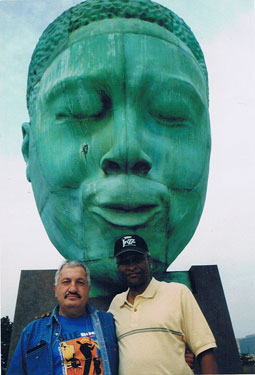 Cannonball Adderley and Jackie McLean seem to be one of your sources of inspiration. Cannonball Adderley and Jackie McLean seem to be one of your sources of inspiration.
Certainly one of the first, the first one after my father. I got into jazz through the back door. To give you the complete picture I was listening to rhythm and blues on the radio, to people like King Curtis, Maceo, Junior Walker, etc. I grew up listening to this music. When I went to high school, I heard Charlie Parker and that changed everything for the young man that I was playing clarinet in the school band. That’s where I heard Charlie Parker and realized that jazz musicians existed before I was born. People who had the same desire. And I realized I had be a jazz musician. I had always played clarinet, played piano but I didn't know of any jazz musicians till I heard Charlie Parker. From there I learned about Cannonball Adderley who was a big influence. You're right about Cannonball and Jackie McLean. I got a chance to meet these men. I was very close to Jackie McLean. They were a great influence and inspiration.
Why did you come to live in Kansas City a few years ago? What is the jazz scene like today?
Oh, the jazz scene is very good in Kansas City. Many young people enroll in our jazz program. The musicians there embrace the arrival of young musicians. There are jam sessions almost every night and there are lots of opportunities to work around town in different situations. I came back to Kansas City because the Kansas City Conservatory of Music and Dance offered me the chance to direct its jazz program. Also because my parents were aging and my wife is from Kansas City. I was getting tired of travelling so much. I was working everyday but I had no security or health insurance. That experience lead me to where I am now. Kansas City is a great town. A lot of people don't realize it.
You are a graduate of the University of Miami. Is teaching jazz important, can it really be taught academically?
That's a good question. Studying is hard. It's not for everybody. When I was in school, going to a University gave you the discipline to organize information and to complete syllabus. When you go out into the world, you have to do the same thing and that’s what I think you get from school. There is lot of information and people who can provide you information. The rest is up to the students. Do they have the imagination? Do they have the drive, the dedication to follow this path? Because it's not an easy path. So I think it's good that professionals like me are coming to the schools because students can learn from my experience. Hopefully I can convey inspiration to them, but it's not for everybody. Some students become teachers and I hope that through our program they will be become better jazz teachers. Some of the kids go to New York, some return back home or maybe to a city like Chicago or wherever. Different paths. Jazz is up to the individual.
What is your role as the director of jazz studies at the University of Missouri-Kansas City?
To direct the jazz department, I work with my associate Dan Thomas. Between Dan Thomas and myself we try to provide a direction for the other departments of what we think is important to do. We raise money from donors for scholarships. We provide travel opportunities to the jazz band. We went to Louisville, Kentucky, for the annual conference of the Jazz Education Network. We took our band there, then we went to Illinois, Europe where we played at the Marciac Jazz Festival, we played in Paris, at the North Sea Jazz Festival. Two years ago, we were invited to go to Japan. We made a recording. So we have a vision of what we offer to our students.
Do you still have time to participate to the "Jazz in America” program at the Thelonious Monk Institute?
Oh yes I do. One beautiful thing about the job I have now, I mean the position, is that I can pick and choose the gigs I want to do. So one of the things that I have been dedicated to is the Thelonious Monk Institute. We go out to the schools around the country and we put on a one hour performance. We call it ‘informance’, information and performance, and we give a presentation to the general student population. Not only to the music students but to all the students. We talk about jazz and we speak about how jazz specifically works. We perfom for the students and we love it.
When we talk to Wynton Marsalis, we think of New Orleans and talking to you, we think of Kansas City. You are like the guardian of the memory of this city. I think of your activities in "Jazz Across America ” or in the 18th and Vine Big Band...
I’m the guardian of information and history, this is true. Jazz is always evolving. But the legacy that I have received from the older musicians, I have the responsability to pass it on although I am not a direct witness of this history. I play my own music. I have the story inside me. Acting with my big band is a way to bring together all the top musicians in Kansas City. Sometimes some of my difficult students are playing in the band. The "Jazz in America” program at the Thelonious Monk Institute is another path. I think it's important that for young people to understand the history of Kansas City and then to know how much jazz history America has. For the Black and the White. Some young black kids aren’t aware of their history and the role their people played. So we have a responsibility. It's a matter of education. We have a mission.
Recently, you composed The Gate's BBQ Suite. The result reflects your personality that is both contemporary and traditional.
Yes that’s true. It was recorded with my students which I'm very proud of. I produced it and released it myself because if I try to take a project like this to a record company they would say "Well it's students work why don't you get Jon Faddis and this and that” and then say no. My students and I worked on that music for two years. They own that music. I’m connected to that music because of my love for barbecue. My grandfather had a barbecue place and I grew up with barbecues. It's a part of me. I have a barbecue, my brothers do too. It's a tradition in our family. I thought about a Barbecue Suite for many years. As I was writing each piece, I was writing about my personality and I'm very proud of that work. It's very popular and people still buy the CD. It has a life of its own and it worked out in different cities already. I think it reflects my personality deeply and I tried to. I conform to the tradition of swing music but I still listen to what’s playing today. I love how the young musicians are playing it.
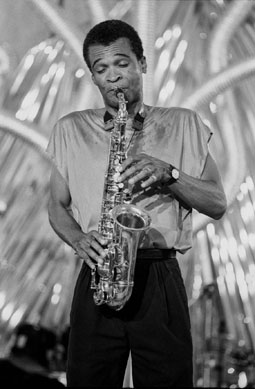 In the 1970s you moved to New York. What are your memories of that time and of that city that is so full of jazz? In the 1970s you moved to New York. What are your memories of that time and of that city that is so full of jazz?
Oh it was a very exciting time for me. I went to New York on August 24, 1976. It was a Sunday. I stayed with a friend of mine who had an appartement there. So I immediatly went to the Village, Greenwich Village, and I heard about jam sessions. The first day there I met Albert Dailey, Billy Hart, Rufus Reid and I went to sit and play with them. Dailey had a jam session every Sunday at a place called Folk City and, man, I was a follower of that energy. That night I went around the corner to the Village Gate and saw Rahsaan Roland Kirk. What a first day! I could hardly sleep the next night. I was full of energy and I was feeling all these vibes. I went there every night to meet my heroes. I met George Adams, then Billy Higgins. All these guys were friendly, they helped me. There was Curtis Fuller. He got me in touch with Art Blakey. It was such a great time. All the musicians were there. If you think that ten years ago was a good period, you should have been here twenty years ago. And I'm saying the same thing now to the young people. Horace Silver was still playing, Buddy Rich was still alive. Count Basie was still here. Young people had opportunities. It was exciting, all of us went there. There were so many opportunities that don’t exist for the young musicians anymore. You could go to Europe. There were festivals all over the place, clubs in New York. You could go on the road in America for a month. Two weeks in San Francisco, a week in Chicago. It was quite an exciting time to me. Now it’s changed. It's not like that anymore. I never imagined that I would be teaching at a conservatory. There was so much going on. I didn't have the time. Didn't want to teach. It was too good. And then things began to change and I got older.
I guess having been a part of the Jazz Messengers remains the highlight of your experience as a musician. Do you remember how you first met Art Blakey and what his music meant to you at the time?
Having been with Art Blakey maybe saved me ten year, maybe thirteen, for how to present the music. I learned how to present the music with Art Blakey, relax and play the music, build solos, how to program a set of music, be professional, love people and embrace the world. Art Blakey was a great man, a great person. He loved young people. Art Blakey loved life and young musicians. He loved playing the drums and being on stage. I learned that there is no other place for a jazz musician than being on stage to reach people, not to play down to them, but reach people to the heart and be sincere. He was sincere and he had fun. If people see you have fun, the feeling comes and they become part of it. I get emotional talking about Art Blakey. I met people like him, I met Dizzy, I met Dexter. The world needs people like that. [Bobby Watson is very moved. He takes a moment.]
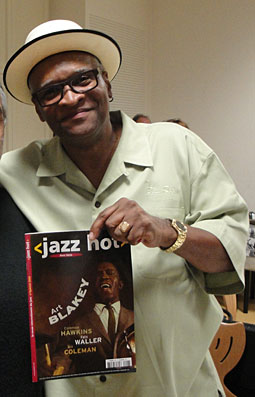 Would you use the word "apprenticeship” to describe your experience with the Jazz Messengers based on the number of musicians that have become leaders after working with Art Blakey? Would you use the word "apprenticeship” to describe your experience with the Jazz Messengers based on the number of musicians that have become leaders after working with Art Blakey?
Art Blakey taught us that no matter how tired you are or how frustrated you are, you come to the bandstand to make music. When I met Art Blakey, it was kind of like meeting your soulmate. I was very close to Art Blakey. I stayed with him four and a half years. One day, he told me: "Bobby, you have been four and a half years with me. You went all around the world with me and you’re starting to turn grey. I think you're ready to fly. I want to bring on more young people.” He was very dedicated to the young people. "When the guys get too old, I get some young ones.” He didn't want to play with old people. He wanted to play and be around young people. I’ll try to speak about Horizon a little more. I tried to do Horizon with Ed Simon and Terrell Stafford, who were both young. Benny Green, Stephen Scott, Joey Claderazzo and Danilo Perez played with us. This was very important. I learned what I was supposed to do: to bring in young people.
Cedar Walton said Art Blakey encouraged young musicians to compose. In fact, many of your themes have been played by the Messengers.
That's right. He encouraged all the young musicians to write music. I had been in the Messengers for 3 weeks when we went in the studio and he knew I wrote music. He looked at me and said "Who has something?” and I went "I do”. So within 3 weeks I recorded three songs, "Hawkman”, "E.T.A.” and "Time Will Tell”, and from there on I was encouraged to write. James Williams, Charles Farmbrough, Dave Schnitter started to write too. Art was very strong about having his musicians compose.
Other drummers, like Charlie Persip, Louis Hayes, Philly Joe Jones and Panama Francis, have been important for you through the years. This eclecticism characterizes you perfectly.
Yes, I have this connection with drummers ever since got a chance to play with other drummers, like Elvin Jones, Max Roach, a little bit with Roy Haynes. To be a part of Roy Haynes’ band is still my dream. Everytime I see Roy Haynes, I tell him "Man, I really want to play with you” and he answers "I'm here. Where are you?” You know, I went to college with Curtis Lundy. He taught me how to hear drums and to learn the language of the drum, its rhythm. So I was naturally attracted by drummers. I learned a lot from him, from Panama Francis. I have to say that I know how to play with the drummers. I know the language of the drums.
Let’s go back to the beginning of Horizon. You said in an interview that the orchestra is an instrument in itself. What do you mean by that?
The thing that makes Horizon is the individual. Each individual is a section. The trumpet is a trumpet section, I’m the sax section, etc. Ed Simon’s playing is not Horizon’s but his own. Same for the others. With Victor, we try to keep Horizon going with other musicians. Art Blakey had such a big sound that whoever played with him remains a Messenger. But for me, as a horn player I don't have that power. So we stopped playing together and got back later because Horizon’s sound is like a family. Sometimes we have another piano player. Sometimes, but not often. We try to play less so that us five can come together. If Terrell Stafford can't make it, we will bring Melton Mustafa. Fortunately Melton is recovering right now. He was very sick. He had cancer but he is fine now. When I play with my quartet and if Curtis Lundy can't make it I don't play certain songs. Because Curtis has the sound that I need to play these songs. I don't want anybody else to play them. It’s the same with Horizon. There are certain songs I can play only with Horizon. I like to travel around the world with Horizon. I think certain musicians own the music. Other musicians can play it, but I don't wanna hear it. It’s very hard to play songs without the right musicians. The band started with Curtis Lundy, Mulgrew Miller, Kenny Washington and me. A the very beginning, we made a record called Beatitudes. Friends of mine, that are twins, Doug and Darryl Jeffries, gave us the name Horizon. That’s why we called a tune "Heckle and Jeckle”, for these identical twins. It was a cartoon about these two identical birds. You couldn’t tell one from the other, like the Jeffries brothers. So they gave us the name Horizon. I didn't like the name at first. Then it sort of made sense. The future being in the present and related to the past. It started as a quartet. One day, Kenny Washington got busy with Johnny Griffin then Benny Carter. With Victor, we played gigs in New York opposite Woody Shaw. Victor was with Woody Shaw at the time. He heard us play and came to me. He said "Bobby, I wanna be a part of this.” So Victor came in. Then Curtis couldn’t make it. Carroll Dashiell came in. Mulgrew got busy. Ed Simon came in. Then Milton came in. Carroll Dashiell got a teaching job in North Carolina. So Essiet came in.
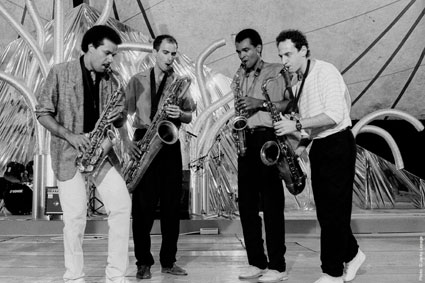 When we listen to Horizon, the quintet seems freer than the usual hard bop units. Is this due to your past experience in the 29th Street Quartet? When we listen to Horizon, the quintet seems freer than the usual hard bop units. Is this due to your past experience in the 29th Street Quartet?
Absolutely. The 29th Street Quartet is very important in my life because we were able to take the music, stretch it or freeze it, stay on one section of the music, move slowly or even move backwards, start in the middle of a song and move on. That affected my thinking about the form of the music. We are still in contact. We did a small tour two years ago. We hope to do more. We have brilliant saxophone players in the 29th Street Quartet.
Do you continue to look for new talents as you did with Roy Hargrove and Frank Lacy?
Yes I do. I have a drummer from Baltimore who is going to China with us. His name is Eric Kennedy. He is a very fine drummer and there is also Richard Johnson who not many people know but he played with Wynton Marsalis. There is Eden Ladin on piano and Philip Dizack on trumpet. People now hear about Warren Wolf who now plays with Christian McBride. It is very important for us to discover new talents.
Are any concerts with Horizon scheduled since its reunion in 2004?
Yes, we are planning to tour in 2013. Next year we hope to work it out with everybody’s schedule. We tried this year but it was too late.
Do your different experiences have a common feature?
Yes, I think so. To me melody is most important as well as being able to feel the music. In everything I have done I have always been connected to people. I want people to listen to me, I don't want to give them a headache. I don't worry about being innovative because when a person is born and if they try to do what they feel in their heart, they are innovating. There is only one Bobby Watson and there will not be another one. There is only one of you. So follow your heart and be honest. That's innovation. Will history remember what I did? That I don't know.
You did a gig with The Leaders 2 or 3 years ago. Was this a one time event?
I talked with Chico Freeman about it. Last December we did a concert near Nice. I forgot the name of the town [Draguignan]. We played with Buster Williams. We did another gig with Billy Hart, Cecil McBee and Fred Hersch. It is sort of a similar thing with the Leaders. First they had Arthur Blythe and he had to deal with health problems. So they called me.
In 1987, you made a beautiful tribute to Johnny Hodges with The Year of the Rabbit. What does his music mean to you?
Johnny Hodges was just the pure expression of beauty on the saxophone. Today a lot of musicians are afraid of playing beautifully. They want to play fire, fast, hard, hot. But Johnny Hodges can do all that and still be beautiful. That’s what I want.
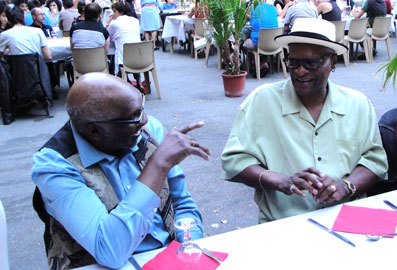 Tonight you are playing with pianist Harold Mabern, from Memphis. Tonight you are playing with pianist Harold Mabern, from Memphis.
I'm very happy to play with him. We played together with George Coleman in his octet. Harold Mabern is just great. He is a great human being and a great musician. I'm very happy to see that Harold is still out travelling around and playing. He is one of my old time favorite people and certainly one of my favorite pianist.
What are your current projects?
I'm working on another suite for big band. Maybe with vocals and dance. I'm trying to go bigger and I'm also working on something that is reaching back to my childhood. I’m trying to bring something that I grew up with. I can't say more, but that’s the idea.
Art Blakey used to say that "Music washes away the dust of everyday life”. Is it still the case today?
Yes if that’s in your heart and if that’s what it is supposed to happen. A lot of the music that I hear today don't really wash away the dust. I would tell you this : I believe in swing and I believe in sweeping people off their feet. It's very important. Art Blakey said that music is supposed to wash away the dust of everyday life and that’s what I try to do. When people come to hear me, I try to make them forget about their troubles. Come and hear for one or two hours and try to feel better. That's very important
Just a word about Barack Obama. Has he changed the lives of African Americans in the USA?
Ah Barack! Let me tell you something. I'm very proud of him. When he became president, he caused more problem that he would think because the country now is more divided. The problems of race and Black and White are not gone in America. Now this election is really based on people who hate him or like him. It's not even about politics. Some people hate Barack Obama because he is black. It’s true. It's not about his politics. They don't like to see a black man at the White House. They want him out. [Since the interview, Barack Obama has been reelected.]
Sélection discographique
Contact : www.bobbywatson.com
musique
https://www.youtube.com/watch?v=uolb1nuDALs
https://www.youtube.com/watch?v=mLxpV1tuALg et https://www.youtube.com/watch?v=PLmwnqnlwTk
https://www.youtube.com/watch?v=v-yBgv-eh1U
https://www.youtube.com/watch?v=Bxs8BSFJYxc
https://www.youtube.com/watch?v=wuGBr_Rv67g
Summer 2013
23-25/6 : UMKC Jazz Camp, Kansas City, MO
1/7 : Libor Šmoldas Quartet, The Loop Jazz Club Hybernia, Prague, République tchèque
4/7 : Libor Šmoldas Quartet, Il Ritmo delle Città 2013, Milan, Italie |
|

